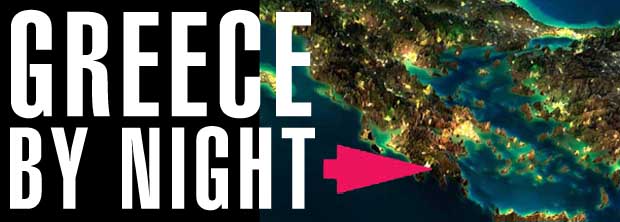Greece and the economic crisis 2015
NEWS ARCHIVE - May 6 - May 11
May 11, 2015
The desire for EU to validate the economic progress Greece has made
The ongoing pushing-and-pulling between the two sides. The need for the EU to substantiate Greek progress severs many purposes, one being the simple positive news to let Greeks have optimism that a deal can be reached, since recognizing progress would mean goals are reachable.
Story at BBC News
"Greece's left-wing government has said it will not break anti-austerity electoral promises, something that has put the country at odds with European creditors.
Greece has until June to agree a new reform deal with its creditors.
Greek Prime Minister Alexis Tsipras is reported to have told his cabinet that Europe needs to acknowledge the economic reforms that Greece has made.
"We want a clear confirmation of the progress that has been made," he told a meeting on Sunday, Greece's Ana state news agency reported. Eurozone ministers are not hopeful of a deal being struck."We have made progress, but we are not very close to an agreement," Eurogroup chair Jeroen Dijsselbloem told the Italian newspaper Corriere della Sera.
"It will surely not be reached at the Eurogroup meeting on Monday," he said."
Speed necessary on structural reform
Despite VAT hikes and the general drama of pricing on some items increasing rapidly, Kathimerini sees work accomplished for meeting the requirements the EU was putting forward.
Story at eKathimerini
"...the Eurogroup is on Monday likely to endorse the progress made in the negotiations between Greece and its creditors in the last couple of weeks but the conclusion of the last review of the second bailout program is not in sight yet. History teaches the two parties may be able to agree on measures to fill the estimated fiscal gap but it will be harder to agree on other structural reforms. To bridge the gaps, it requires mutual concessions and political statesmanship, especially in Greece.
...Undoubtedly, more progress has to be made in the days ahead and in our opinion this is more likely on the fiscal side rather than pensions or labor reforms."
Progress despite hardening positions?
The calamity of the economic collapse forced leadership in the EU and Greece into positions that required cooperation, but also defensive moves to protect not just political careers (which was that that successful considering the governments that have come and gone during the crisis) but is also meant protecting the populations of Greece (and from a different point of view, the tax payers in Europe)
Story at ethnos.gr
"Decisive developments are expected to be the current meeting of the Eurogroup. At the moment the government is seeking progress though partners harden their stance in the negotiations.
'We want to have a clear recognition of the progress achieved,' Prime Minister Tsipras has stressed at the marathon meeting of the government council."
Failure in negotiations a real possibility
Story at WSJ
A contingency plan in case of default is obviously not just "normal" business preparedness planning, but also a leveraging chip to work into the negotiations themselves.
"The International Monetary Fund is working with national authorities in southeastern Europe on contingency plans for a Greek default, a senior fund official said—a rare public admission that regulators are preparing for the potential failure to agree on continued aid for Athens.
...“We are in a dialogue with all of these countries,” said Jörg Decressin, deputy director of the IMF’s Europe department. “We are talking with them about the contingency plans they have, what measures they can take.”
...“It would be foolish for anyone in the policy world not to be worried at this stage,” Mr. Decressin said."
The massive importance of the IMF and ECB in negotiations
This seems to be a simple case of forces moving into different positions to try and get the other side to comply with the new conditions with a concession.
Story at NY Times
"...The influence of the E.C.B. and the I.M.F. will be felt behind the scenes on Monday, when finance ministers from Greece and other European nations meet in their latest effort to break an impasse that is paralyzing the Greek economy and frightening global markets.
...If there are no concrete signs of progress in the talks Monday, a majority of the central bank’s governing council would be in favor of placing additional restrictions on lending to Greek banks as early as this week, people briefed on the council’s discussions said.
“Their interest is to get their money back,” said Zsolt Darvas, a senior fellow at Bruegel, a research organization in Brussels.
Greek officials, meanwhile, have contemplated steps that would test the institutions’ hard-line stance."
The ECB encountering heavy criticism from Greece
Publicity on the ECB "hard line stance" generates stories easily for the media. Heckling, complaints and anger feed the image of hard-headed negotiations and growing frustration (and anger mixed with panic).
Story at UK Telegraph
"In the last three months, the Frankfurt-based ECB has become the target of vociferous criticism for its handling of the Greek crisis.
Weeks before the confetti attack, Mr Draghi was heckled by a Greek journalist at a press conference in Nicosia. Before that, he was the subject of a tirade from a Greek MEP during an address at the European Parliament.
On both occasions, the Italian was shouted down as he was forced to defend his institution’s role in Greece’s debt drama.
...Not only has the ECB rebuffed requests for temporary financial relief, but its disciplinarian stance has led to accusations that it is acting ‘ultra vires’ - taking politically motivated action outside of its legal remit to ensure financial stability in the eurozone."
"Lack of Concern" about crisis?
Following Tsipras accession to leadership, there was perhaps a majority belief that successful Greek and EU negotiations on a bail-out of the crisis was inevitable. But as the stories on less-than-smooth meetings came out, that optimism was fraying. But the Guardian sees a lack of anxiety within Greece itself with the people the most obviously connected to the talks.
Story at UK Guardian
"The talks between Alexis Tsipras’s government and its creditors have dragged on for so long that it has become hard to believe there will ever be a decisive make-or-break juncture. And never has that been harder to believe than now, with the arrival of summer and the entrancing distractions it brings to a country like Greece.
There is a striking disconnection in Athens between the blithe lack of concern that the government evinces, and which it has successfully communicated to much of the public, and the objective seriousness of Greece’s plight.
....This week Greece and the eurozone face a week of fresh nail-biting uncertainty as the single currency area’s finance ministers prepare to report on progress towards an agreement with Tsipras’s government. On Tuesday Greece is due to repay €770m (£560m) to the IMF.
...The evidence of real and painful economic hardship is subtle in Athens...”
May 10, 2015
Can pressure make Merkel give up on a solution for Greece?
Between Media stories of Greeks being "lazy" or not taking the economic problems seriously, plus the sometimes angry negotiations between leaders, it was inevitable that a "just give up" sentiment would develop.
Story at Bloomberg
"German Chancellor Angela Merkel is coming under growing pressure from within the ranks of her own party bloc to give up on Greece for the sake of the euro.
...With European finance ministers due to resume talks on Greece on Monday, hardening sentiment in Germany risks sending mixed signals to investors as Prime Minister Alexis Tsipras’s government attempts to reach a deal with creditors.
...As talks between Greece and its creditors drag on, the view that the euro would be stronger without Greece is gaining ground in Merkel’s Christian Democratic-led bloc, according to two lawmakers. They asked not to be identified because they don’t want to publicly challenge Merkel.
“Having its own currency could help Greece get back on its feet,” Hans-Peter Friedrich, one of 29 lawmakers from Merkel’s bloc who voted against extending Greece’s aid program, said in an e-mailed answer to questions."
Here comes the bill: €750m repayment to IMF is due
"Cancel the holidays' is the message of this FT article.
Story at Financial Times
May 9, 2015
A solution has to be reached: Samaras
Serious issues developing as the crisis continues and no surety of a deal that could at least keep a root-piece of the economy in tact so it could be regrown. Complete devastation peering around the corner begins to infect many viewers within Greece.
Story at ANA-MPA
"I was the one who, throughout this period, insisted intensely there should be a solution. There should be a deal because it cannot continue this way," New Democracy leader told Focus FM, adding he’s worried the government will launch a tax raid because SYRIZA was unprepared to govern.
"The economy has really reached the limits. Nothing works. Right now there’s a complete economic immobility, which is also powered by a very negative psychology. This combination is destructive for the Greek economy,” Samaras was quoted as saying."
May 8, 2015
Greece sees USA and Russia vying over pipeline projects
One advantage a pipeline like this would make for is the cooperation between the various countries to make it work effectively, creating an impediment for the frequently bellicose activity of some of these governments.
Story at Foxnews
"Greece's left-wing government has expressed interest in a Moscow-backed pipeline project dubbed Turkish Stream that would bring natural gas across the Black Sea to Turkey and from there to Europe, potentially through Greece. The U.S. has been encouraging the Trans-Adriatic Pipeline, which will take Azeri gas from the Caspian Sea to Italy. "
Finance Minister Yanis Varoufakis "baffles" EU leadership
How to create a depository for NPLs from Greek banks is mysteriously left unexplained, part of the 'bafflement.' Perhaps it is more obvious to outside observers, suspecting the idea is to have funds from outside of Greece compiled for that purpose.
Story at WSJ
"Economic plans and growth estimates distributed by Greek Finance Minister Yanis Varoufakis to some of his eurozone counterparts have baffled officials involved in the talks over its international bailout.
Officials say that the files differ greatly from what has been discussed at the technical level in Brussels in recent days and underline how Mr. Varoufakis continues to complicate progress toward a financing deal.
...While some of the outlined measures are the same as those agreed to in the negotiations—such as the creation of an independent tax commissioner—the paper differs in other areas.
One significant difference is the creation of a so-called bad bank that would house and wind down Greek lenders’ bad loans. “Conveniently, the financing of the bad bank is not treated,” an EU official said."
The loan payment is made under desperate circumstances
Varoufakis suggests a solution using a "bitcoin mechanism."
Story at CNBC
"This past Wednesday, Greece was able to make a 200-million euro (US$224 million) interest payment to the International Monetary Fund, but only by requiring all state enterprises — including schools and pension funds — to transfer reserves to an account at the Greek central bank. Next Tuesday, Greece faces an even bigger payment of 750 million euros to the IMF. As of now, it is unclear how Greece will manage to make this payment.
...The European Central Bank is apparently working on an IOU-based secondary currency similar to the IOU's used by California in 2009, according to a Reuters report last month. Interestingly, Yanis Varoufakis (Greece's new Finance Minister) wrote a blog post in February proposing a similar currency, which he dubbed Future Tax Coin (FT-Coin).
In both of these cases, the secondary currency would borrow tax revenue from the future to pay for obligations today. Furthermore, the secondary currency would be tantamount to a T-bill that was backed by the full faith and credit of the Greek government. As a trust-based financial instrument, acceptance would be a function of the confidence in the Greek government to collect future taxes."
Sport fan violence confronted with new laws
Greece under pressure from UEFA and FIFA to enact new legal limitations on game violence.
Story at Yahoo Sports
"The Greek parliament on Thursday voted into law a controversial bill to curb violence in domestic sports..."
Brinkmanship in the Varoufakis style
Austerity is the sticking point, though how this can work out in the favor of Greece is something that appears to be moving further and further away..
"Greece has less than a week to prove to the European Central Bank that it’s serious about reaching an agreement with international lenders. Failure to make progress in bailout talks or repay about 745 million euros ($839 million) owed to the International Monetary Fund on May 12 may prompt the imposition of tighter liquidity rules on its banks.
...Varoufakis said that while there’s convergence between the two sides, the Greek government won’t bow to creditors’ demands for more austerity."
Tsipras: we can have a "happy Ending"
Story at Reuters
Video report at Reuters about the optimism in the Greek government, despite the allegations that collapse is just around the corner in negotiations.
"Greece's PM hopes a deal to access emergency funding will soon be reached - others aren't so optimistic. Kirsty Basset reports."
Further coverage:
May 7, 2015
The Red Lines of the Greek position still stalking negotiations
The difficulty of maintaining the status quo on the core SYRIZA support (and that groups hoped for solution that involves cuts, just not on pensions and labor-protection regulation) becomes more tenuous.
Story at Yahoo News
"Greece's new leftist government has said further cuts to pension payments and reforms making it easier to fire workers in the private sector are among "red lines" it will no cross.
"There should not be an expectation on the part of institutions that the government has to back down on everything in order to have a deal," Gabriel Sakellaridis told a news conference.
...An omnibus bill of reforms promised to lenders in return for aid will only be submitted to parliament after a deal with the creditors has been struck, he said. "
Vote of confidence from France
The long history between the two countries made this position predictable, though not an absolute certainly in light of the sometimes bitter rebukes as talks over a deal progress.
Story at Investing
"French Finance Michel Sapin said on Thursday that euro zone states would find a solution to the Greek debt crisis and that Greece should remain in the currency union.
Speaking to the finance committee of the European Parliament in Brussels, he said it was "legitimate" for the new Greek government to seek changes in line with the will of its voters but also that Greece "must respect its commitments" as a long-standing member of the European Union, euro zone and IMF. "
Golden Dawn gets brief reprieve as trial postponed
Story at UK Guardian
May 6, 2015
Hesitation in will by EU to rescue Greece: contemplating the cost
Story at NY Times
Reform and modernization chief subjects in talks, including pension cuts and reforms on employment protections.
ReutersAnger and worry as the question of sustaining debt load of Greece is questioned
A "make or break" meeting
Story at Yahoo
Blame continues to be thrown at EU negotiators by Greek team
A "last-ditch diplomatic offensive" in the offing with "it's not our fault" the main claim.
Story at eKathimerini
Five years with no finish line anywhere to be seen
Story at Fox News
"...after a myriad budget cuts, a million lost jobs, 250,000 closed businesses and nearly 240 billion euros ($267 billion) in rescue loans, the country is once again on the brink of default..."
A deal is close, but not certain
A cash liquidity squeeze is putting the entire concept of a rescue into jeopardy.
Story at Reuters
"As a goodwill gesture, a senior privatization official said Athens was ready to finalize a 1.2 billion euro deal ...
But euro zone central bank sources say hardliners led by Germany's Bundesbank want the "haircut" on Greek securities offered as collateral for the funding to be increased following recent credit rating downgrades of Greece and its banks."
Time crunch, personality crunch; desperate last days to make deal
Is this the technique of brinkmanship at work? Or a desperate political position that on one hand (if there's no deal) could mean financial disaster for Greece, or on the other hand (if pension cuts and employment reforms committments are made) political disaster for SYRIZA.
Story at BBC
"The Greek government is desperate to reach a deal with its international creditors before a scheduled €1bn debt interest repayment to the IMF on 12 May, but the two sides have yet to agree on labour reforms and pensions.
Acknowledging the awkward relations with his EU counterparts, Mr Varoufakis said communicating was difficult: "There are many of us and we can't discuss amongst one another."
NEWS ARCHIVE - May 2015



Greece's Golden Visa program


